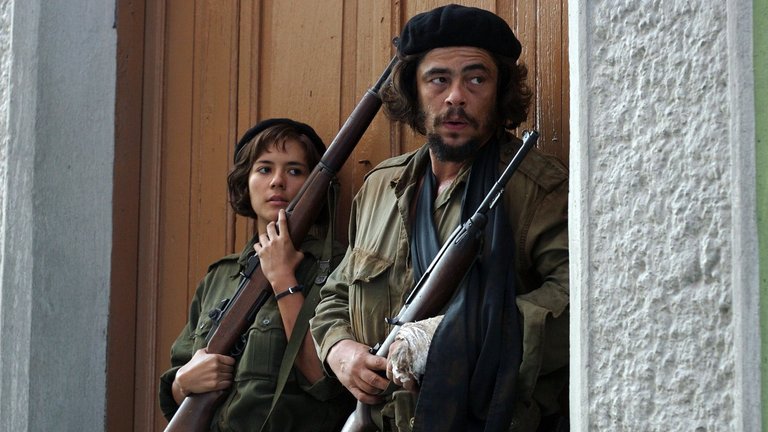Film Review: Che (2008)

Some historical figures are simply too monumental for their lives to be encapsulated within the confines of a single biopic, regardless of the budget or the talent of the director. When filmmakers attempt to condense such vast narratives into a solitary film, the outcomes often fall short of expectations. This is evident in Che, the 2008 film directed by Steven Soderbergh. Despite being helmed by an esteemed and award-winning director and receiving considerable acclaim from critics, it does not emerge as the undisputed classic one might anticipate.
The film is dedicated to Ernesto “Che” Guevara (1928-1967), an Argentine physician who rose to prominence as a leader of the Cuban Revolution and later gained infamy for his unsuccessful efforts to replicate this success in Bolivia, which ultimately led to his execution. His death transformed him into a martyr and an enduring revolutionary icon for idealistic youth in subsequent decades.
Che is structured in two parts, running nearly four and a half hours in total. The first segment, titled The Argentine, portrays Che (played by Benicio del Toro) as part of a small group of rebels led by Fidel Castro (Demian Bichir) who arrive in Cuba in 1957 with the aim of overthrowing the corrupt regime of Fulgencio Batista. Despite facing numerous challenges, they gradually evolve into an effective guerrilla army, culminating in Che's pivotal role during the decisive Battle of Santa Clara at the end of 1958. The second part, titled Guerrilla, follows Che's secret arrival in Bolivia in 1966 with a band of volunteers, aiming to incite an uprising against right-wing President Rene Barrientos (played by Joaquim de Almeida). This venture, quickly spirals into disaster, leading to Che's capture and execution with the assistance of the CIA.
The film was a passion project for del Toro, who co-produced it alongside Laura Bickford. Initially intended to focus solely on Che’s Bolivian misadventure, renowned director Terence Malick was attached to direct before stepping away, allowing Soderbergh—who had previously collaborated with del Toro on Traffic—to take over.
Having Soderbergh at the helm can be both advantageous and detrimental. On one hand, he approached Che’s expansive life and the film’s bifurcated structure as an opportunity for experimentation, striving to differentiate it from typical Hollywood biopics. This ambition manifests through various cinematographic styles and a non-linear narrative that may appear pretentious or confusing to many viewers.
Conversely, Soderbergh utilises this two-part structure to craft two distinct films that, while varying in coherence, ultimately create a unified narrative. The first part set in Cuba is more conventional and accessible for general audiences, whereas the second part reflects Che’s isolation and defeat, presenting a chaotic and often bleak perspective that may resonate differently depending on viewers' sympathies towards his cause.
Critics have largely praised Soderbergh’s film, particularly those with leftist leanings; however, this acclaim did not translate into box office success or accolades at prestigious awards ceremonies. Part of this may stem from the film's excessive length and its challenging nature for mainstream audiences.
The portrayal of Che also faced scrutiny regarding political bias. Benicio del Toro dedicated significant time to researching Guevara’s life—meeting friends and family while studying his journals—which may have influenced both his performance and the film’s narrative perspective. In Che, despite his tragic end, Guevara is depicted as a heroic figure, with the film notably omitting references to some of his more contentious actions, such as mass executions conducted in post-revolutionary Cuba.
While Che is undeniably flawed, it stands in stark contrast to Hollywood's earlier attempt at capturing Guevara's life with the misguided 1969 biopic Che! starring Omar Sharif. However, it pales when compared to The Motorcycle Diaries (2004), which offers a more focused depiction of Guevara's early years.
Despite its shortcomings and excessive length—which may deter less patient viewers—Che remains an intriguing film that serves as a valuable introduction for those seeking to understand one of the most iconic figures of the twentieth century.
RATING: 5/10 (++)
Blog in Croatian https://draxblog.com
Blog in English https://draxreview.wordpress.com/
InLeo blog https://inleo.io/@drax.leo
Hiveonboard: https://hiveonboard.com?ref=drax
Rising Star game: https://www.risingstargame.com?referrer=drax
1Inch: https://1inch.exchange/#/r/0x83823d8CCB74F828148258BB4457642124b1328e
BTC donations: 1EWxiMiP6iiG9rger3NuUSd6HByaxQWafG
ETH donations: 0xB305F144323b99e6f8b1d66f5D7DE78B498C32A7
BCH donations: qpvxw0jax79lhmvlgcldkzpqanf03r9cjv8y6gtmk9